This report explores Indigenous perspectives on homelessness prevention with a focus on Shelter Diversion and Eviction Prevention. It highlights historical and current factors contributing to Indigenous homelessness and includes insights from Indigenous and non-Indigenous authors, organizations, and service providers on essential elements of effective prevention strategies.
About the Project
The primary aim of this project is to enhance the existing literature on Indigenous homelessness prevention intervention models for Indigenous Peoples.
Through an environmental scan of literature and existing programs, we adopt a decolonizing lens to explore Indigenous perspectives on prevention, including diversion from shelters and preventing eviction. Recognizing the ongoing impacts of colonization is crucial for developing effective policies. It is equally important to consider recent responses such as the Truth and Reconciliation Commission and Calls to Action, and the Missing and Murdered Indigenous Women and Girls and the Calls to Justice, and their implementation, or lack thereof, to understand ongoing issues related to homelessness for Indigenous Peoples.
Findings and Recommendations
- Wholistic models that integrate health and healing through a cultural lens alongside community support, particularly for youth, women, and gender-diverse individuals, show promise.
- Indigenous homelessness prevention initiatives need to be Indigenous informed and led. This requires collaboration with Indigenous leaders and Indigenous community organizations, particularly for non-Indigenous led organizations, in order to enhance programming effectiveness.

